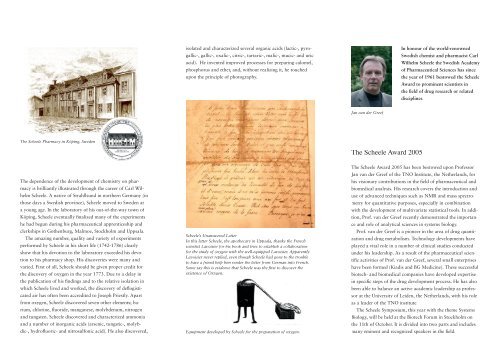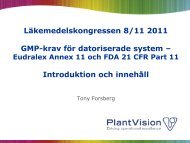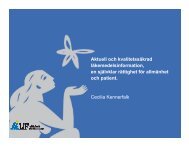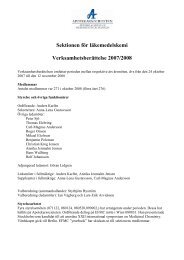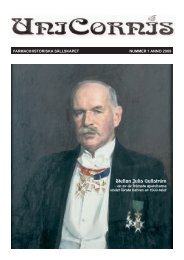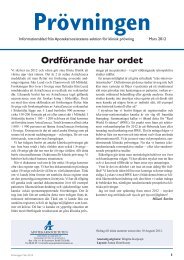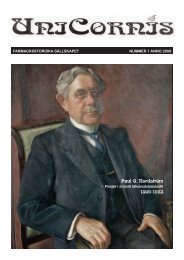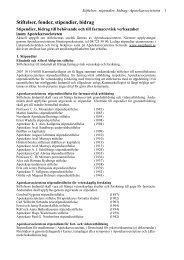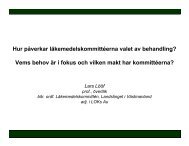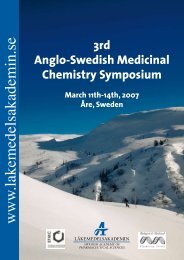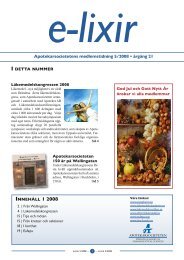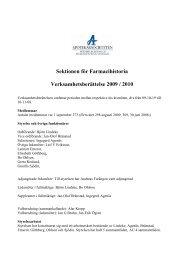Scheele Award Scheele Committee - Apotekarsocieteten
Scheele Award Scheele Committee - Apotekarsocieteten
Scheele Award Scheele Committee - Apotekarsocieteten
You also want an ePaper? Increase the reach of your titles
YUMPU automatically turns print PDFs into web optimized ePapers that Google loves.
isolated and characterized several organic acids (lactic-, pyrogallic-,<br />
gallic-, oxalic-, citric-, tartaric-, malic-, mucic- and uric<br />
acid). He invented improved processes for preparing calomel,<br />
phosphorus and ether, and, without realizing it, he touched<br />
upon the principle of photography.<br />
In honour of the world-renowned<br />
Swedish chemist and pharmacist Carl<br />
Wilhelm <strong>Scheele</strong> the Swedish Academy<br />
of Pharmaceutical Sciences has since<br />
the year of 1961 bestowed the <strong>Scheele</strong><br />
<strong>Award</strong> to prominent scientists in<br />
the field of drug research or related<br />
disciplines.<br />
Jan van der Greef<br />
The <strong>Scheele</strong> Pharmacy in Köping, Sweden<br />
The <strong>Scheele</strong> <strong>Award</strong> 2005<br />
The dependence of the development of chemistry on pharmacy<br />
is brilliantly illustrated through the career of Carl Wilhelm<br />
<strong>Scheele</strong>. A native of Strahllsund in northern Germany (in<br />
those days a Swedish province), <strong>Scheele</strong> moved to Sweden at<br />
a young age. In the laboratory of his out-of-the-way town of<br />
Köping, <strong>Scheele</strong> eventually finalized many of the experiments<br />
he had begun during his pharmaceutical apprenticeship and<br />
clerkships in Gothenburg, Malmoe, Stockholm and Uppsala.<br />
The amazing number, quality and variety of experiments<br />
performed by <strong>Scheele</strong> in his short life (1742-1786) clearly<br />
show that his devotion to the laboratory exceeded his devotion<br />
to his pharmacy shop. His discoveries were many and<br />
varied. First of all, <strong>Scheele</strong> should be given proper credit for<br />
the discovery of oxygen in the year 1773. Due to a delay in<br />
the publication of his findings and to the relative isolation in<br />
which <strong>Scheele</strong> lived and worked, the discovery of deflogisticated<br />
air has often been accredited to Joseph Priestly. Apart<br />
from oxygen, <strong>Scheele</strong> discovered seven other elements; barium,<br />
chlorine, fluoride, manganese, molybdenum, nitrogen<br />
and tungsten. <strong>Scheele</strong> discovered and characterized ammonia<br />
and a number of inorganic acids (arsenic, tungstic-, molybdic-,<br />
hydrofluoric- and nitrosulfonic acid). He also discovered,<br />
<strong>Scheele</strong>’s Unanswered Letter<br />
In this letter <strong>Scheele</strong>, the apothecary in Uppsala, thanks the French<br />
scientist Lavoisier for his book and tries to establish a collaboration<br />
for the study of oxygen with the well-equipped Lavoisier. Apparently<br />
Lavoisier never replied, even though <strong>Scheele</strong> had gone to the trouble<br />
to have a friend help him render the letter from German into French.<br />
Some say this is evidence that <strong>Scheele</strong> was the first to discover the<br />
existence of Oxygen.<br />
Equipment developed by <strong>Scheele</strong> for the preparation of oxygen.<br />
The <strong>Scheele</strong> <strong>Award</strong> 2005 has been bestowed upon Professor<br />
Jan van der Greef of the TNO Institute, the Netherlands, for<br />
his visionary contributions in the field of pharmaceutical and<br />
biomedical analysis. His research covers the introduction and<br />
use of advanced techniques such as NMR and mass spectrometry<br />
for quantitative purposes, especially in combination<br />
with the development of multivariate statistical tools. In addition,<br />
Prof. van der Greef recently demonstrated the importance<br />
and role of analytical sciences in systems biology.<br />
Prof. van der Greef is a pioneer in the area of drug quantization<br />
and drug metabolism. Technology developments have<br />
played a vital role in a number of clinical studies conducted<br />
under his leadership. As a result of the pharmaceutical scientific<br />
activities of Prof. van der Greef, several small enterprises<br />
have been formed (Kiadis and BG Medicine). These successful<br />
biotech- and biomedical companies have developed expertise<br />
in specific steps of the drug development process. He has also<br />
been able to balance an active academic leadership as professor<br />
at the University of Leiden, the Netherlands, with his role<br />
as a leader of the TNO institute.<br />
The <strong>Scheele</strong> Symposium, this year with the theme Systems<br />
Biology, will be held at the Biotech Forum in Stockholm on<br />
the 11th of October. It is divided into two parts and includes<br />
many eminent and recognized speakers in the field.


